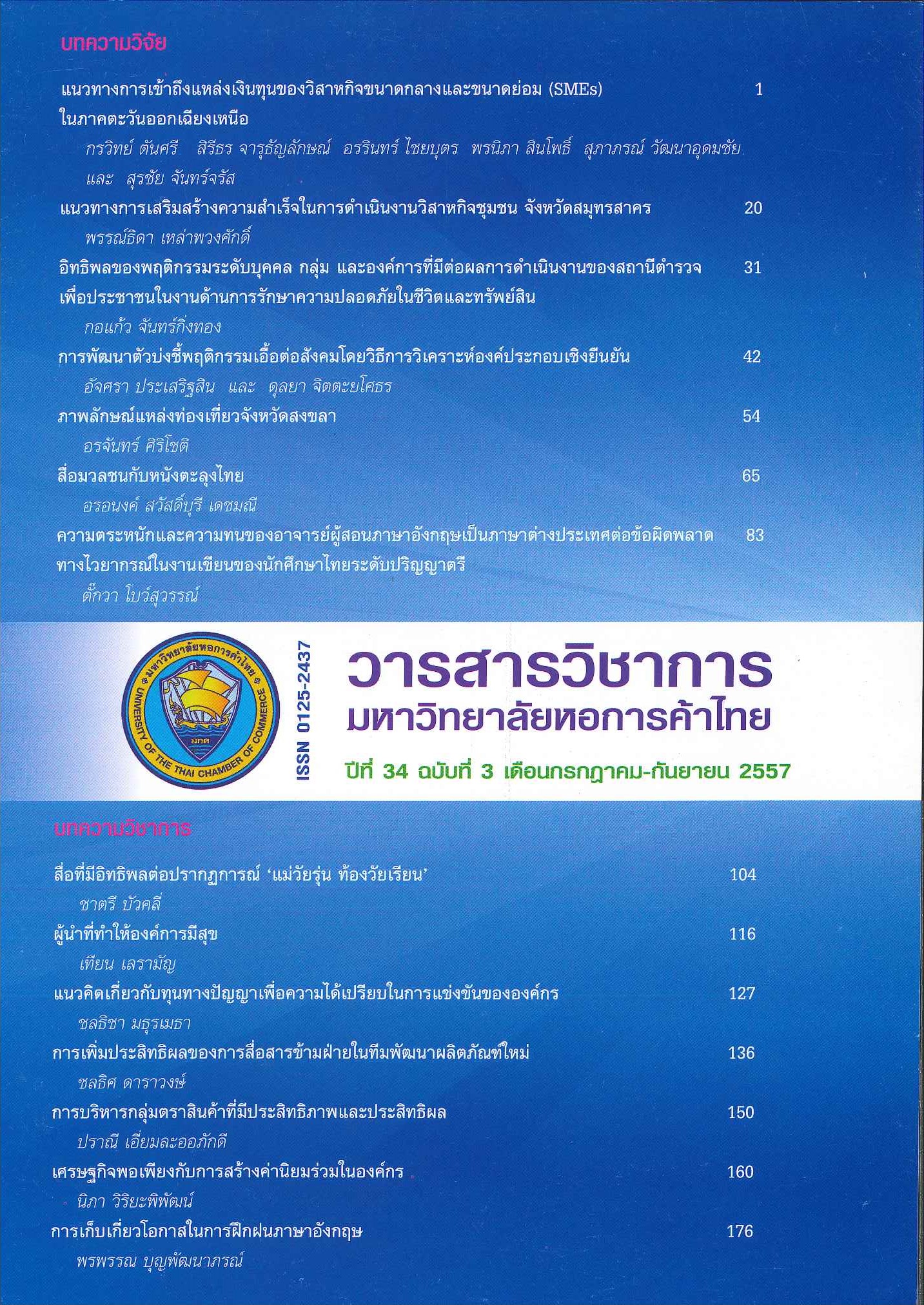เศรษฐกิจพอเพียงกับการสร้างค่านิยมร่วมในองค์กร
Main Article Content
บทคัดย่อ
เศรษฐกิจพอเพียงเป็นปรัชญาที่ยึดหลักทางสายกลาง ซึ่งประกอบด้วย 3 องค์ประกอบ คือ ความพอประมาณ ความมีเหตุผล และความมีภูมิคุ้มกันในตัวที่ดี โดยมีความรู้และคุณธรรมเป็นเงื่อนไขในการปฏิบัติ เพื่อให้เกิดการพัฒนาที่สมดุลและยั่งยืน ผู้นำองค์กรมีบทบาทสำคัญในการขับเคลื่อนปรัชญาของเศรษฐกิจพอเพียงและผลักดันไปสู่การปฏิบัติอย่างเป็นรูปธรรม โดยใช้ค่านิยมร่วมตามหลักปรัชญาของเศรษฐกิจพอเพียงเป็นตัวชี้นำพฤติกรรมการปฏิบัติงานของพนักงานให้เป็นไปในทิศทางเดียวกัน การสร้างค่านิยมร่วมในองค์กรให้ประสบความสำเร็จ เริ่มจากการกำหนดค่านิยมร่วมตามหลักปรัชญาของเศรษฐกิจพอเพียงที่สอดรับกับวิสัยทัศน์และพันธกิจขององค์กร จัดทำแผนกลยุทธ์ของการสร้างค่านิยมร่วม เพื่อให้พนักงานมองเห็นแผนการดำเนินงานในภาพรวมอย่างชัดเจน รวมถึงการบูรณาการค่านิยมร่วมเข้ากับระบบบริหารงานอย่างครบวงจร กระตุ้นให้พนักงานทุกระดับมีส่วนร่วมและปฏิบัติตามค่านิยมร่วมด้วยหลักปรัชญาของเศรษฐกิจพอเพียง ตลอดจนประเมินผลการสร้างค่านิยมร่วมและนำมาเป็นข้อมูลป้อนกลับ เพื่อปรับปรุงแผนกลยุทธ์ ที่จะช่วยผลักดันให้พนักงานปฏิบัติงานตามค่านิยมร่วมได้อย่างต่อเนื่อง จนท้ายที่สุดนำไปสู่องค์กรแห่งความพอเพียงที่เติบโตได้อย่างยั่งยืน
Article Details

อนุญาตภายใต้เงื่อนไข Creative Commons Attribution-NonCommercial-NoDerivatives 4.0 International License.
ลิขสิทธิ์ของบทความ
ผลงานที่ได้รับการตีพิมพ์ถือเป็นลิขสิทธิ์ของมหาวิทยาลัยหอการค้าไทย ห้ามมิให้นำเนื้อหา ทัศนะ หรือข้อคิดเห็นใด ๆ ของผลงานไปทำซ้ำ ดัดแปลง หรือเผยแพร่ ไม่ว่าทั้งหมดหรือบางส่วนโดยไม่ได้รับอนุญาตเป็นลายลักษณ์อักษรจากมหาวิทยาลัยหอการค้าไทยก่อน
เอกสารอ้างอิง
สุขสรรค์ กันตะบุตร. 2554. “มาตรฐานธุรกิจเศรษฐกิจพอเพียง (SEBS).” ในรายงานการสัมมนาเรื่อง เศรษฐกิจพอเพียงกับการบริหารธุรกิจ, หน้า 2, 6-13. กรุงเทพมหานคร:สำนักงานคณะกรรมการพิเศษเพื่อประสานงานโครงการอันเนื่องมาจากพระราชดำริ.
Leepiyachat, Sutin, Pichaiwarutama, Narisa ,and Na Nakhon, Atisuda. 2007. “Sufficiency in Private Business.” Journal of the Economy and Society 44, 4: 8. (in Thai).
สุทิน ลี้ปิยะชาติ, นริสา พิชัยวรุตมะ และอาทิสุดา ณ นคร. 2550. “ความพอเพียงในธุรกิจเอกชน.” วารสารเศรษฐกิจและสังคม 44, 4: 8.
Thailand. Office of the National Economic and Social Development Board. 2007. Sufficiency Economy Implications and Applications [On-line]. Available: http://www.nesdb.go.th/
Md/book/booksuffwork_thai.pdf (in Thai).
สำนักงานคณะกรรมการพัฒนาการเศรษฐกิจและสังคมแห่งชาติ. 2550. การประยุกต์ใช้หลักเศรษฐกิจพอเพียง [ออนไลน์]. เข้าถึงจาก: http://www.nesdb.go.th/Md/book/booksuffwork_thai.pdf
Thailand. Office of the National Economic and Social Development Board. 2008. Summary of the Tenth National Economic and Social Development Plan in 2007-2011[On-line]. Available: http://www.nesdb.go.th/Portals/0/news/plan/p10/plan10/data/สรุป สาระสำคัญของแผนพัฒนาฯ%20ฉบับที่%2010.pdf (in Thai).
สำนักงานคณะกรรมการพัฒนาการเศรษฐกิจและสังคมแห่งชาติ. 2551. สรุปสาระสำคัญ แผนพัฒนาเศรษฐกิจและสังคมแห่งชาติ ฉบับที่ 10 พ.ศ. 2550-2554 [ออนไลน์]. เข้าถึงจาก: http://www.nesdb.go.th/Portals/0/news/plan/p10/plan10/data/สรุป สาระสำคัญของแผนพัฒนาฯ%20ฉบับที่%2010.pdf
Wiriyapipat, Nipa. 2009. “Business Leaders and the Sufficiency Economy Movement in Organizations.” University of the Thai Chamber of Commerce Journal 29, 4: 156-158. (in Thai).
นิภา วิริยะพิพัฒน์. 2552. “ผู้นำธุรกิจกับการขับเคลื่อนเศรษฐกิจพอเพียงในองค์กร.” วารสารวิชาการ มหาวิทยาลัยหอการค้าไทย 29, 4: 156-158.
Yomsin, Ajara. 2013, June 23. “ The Difference: Investor “Values” and Investor “Price”.”Bangkokbiznews [Online newspaper]. Available: http://www.bangkokbiznews.com/ home/detail/finance/personal/20130623/512705/ความต่างนักลงทุนมูลค่ากับนักลงทุนราคา.html (in Thai).
อัจฉรา โยมสินธุ์. 23 มิถุนายน 2556. “ความต่าง: นักลงทุน ”มูลค่า” กับนักลงทุน ”ราคา”.”กรุงเทพธุรกิจ [หนังสือพิมพ์ออนไลน์]. เข้าถึงจาก: http://www.bangkokbiznews.com/home/detail/finance/personal/20130623/512705/ความต่างนักลงทุนมูลค่ากับนักลงทุนราคา.html


